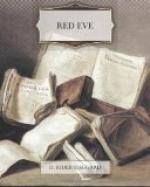Sir Andrew made no reply, only, resting his long sword on the threshold, he leant upon its hilt, and fixed his clear grey eyes upon Clavering’s face. What Sir John saw in those eyes he never told, but it was something which scared him. At least that shortening of the breath of which he had spoken seemed to take a hold of him, for he swayed upon his horse as though he were about to fall, then, recovering, turned and rode straight for Blythburgh.
It was the second night after that day when Sir Andrew had looked John Clavering in the eyes.
Secretly and in darkness those three whom Grey Dick had killed were borne into the nave of Blythburgh church and there laid in the grave which had been made ready for them. Till now their corpses had been kept above ground in the hope that the body of John Clavering the younger might be added to their number. But search as they would upon seashore and river-bank, nothing of him was ever seen again. This funeral was celebrated in the darkness, since neither Sir John nor Acour desired that all men should see three bodies that had been slain by one archer, aided by a merchant’s lad, standing alone against a score, and know, to say naught of the wounded, that there was yet another to be added to the tale. Therefore they interred them by night with no notice of the ceremony.
It was a melancholy scene. The nave of the great church, lighted only with the torches borne by the six monks of the black Augustines from the neighbouring priory of St. Osyth; the candles, little stars of light, burning far away upon the altar; the bearers of the household of the Claverings and the uncoffined corpses lying on their biers by the edge of the yawning graves; the mourners in their mail; the low voice of the celebrating priest, a Frenchman, Father Nicholas, chaplain to Acour, who hurried through the Latin service as though he wished to be done with it; the deep shadows of the groined roof whereon the rain pattered—such were the features of this interment. It was done at last, and the poor dead, but a few days before so full of vigour and of passion, were left to their last sleep in the unremembered grave. Then the mourners marched back to the manor across the Middle Marsh and sought their beds in a sad silence.
Shortly after daybreak they were called from them again by the news that those who had followed Hugh de Cressi had returned. Quickly they rose, thinking that these came back with tidings of accomplished vengeance, to find themselves face to face with seven starved and miserable men who, all their horses being dead, had walked hither from Dunwich.
The wretched story was learned at length, and then followed that violent scene, which has been told already, when Acour cursed his followers as cowards, and Clavering, sobered perhaps by the sadness of the midnight burial or by the memory of Arnold’s words, reproved him. Lastly, stung by the taunts that were heaped upon them, Sir Pierre de la Roche gave Hugh’s message—that if they lifted hand against his love or his House he would kill them like ravening wolves, “which I think he certainly will do, for none can conquer him and his henchman,” he added shortly.




